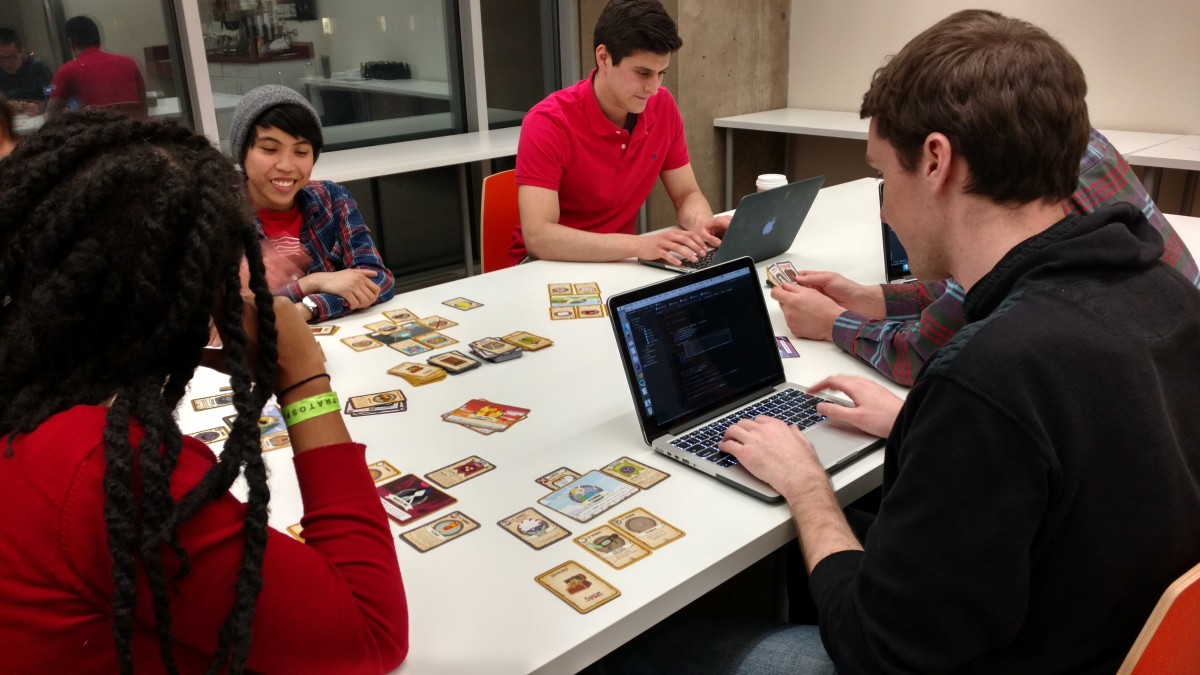 Last year, to the dismay of bloggers everywhere, the popular RedLasso video sharing service – which allowed users to search, customize, and embed video clips from national networks – was forced to shut down after Fox and NBC filed suit against the company.
Last year, to the dismay of bloggers everywhere, the popular RedLasso video sharing service – which allowed users to search, customize, and embed video clips from national networks – was forced to shut down after Fox and NBC filed suit against the company.
On Monday, the Center City-based company announced that it had reached a licensing agreement with Fox Television Studios allowing users of the online video sharing platform to syndicate online customized clips from 27 of Fox’s regional television stations.
Technically Philly sat down with RedLasso CEO Al McGowan and President Kevin O’Kane Thursday evening to discuss how the deal went down, where they’re looking for funding, and what Philly entrepreneur Pat Croce has to do with the video sharing company.
Transcript of interview was edited for length and clarity.
Explain what’s been happening with RedLasso and the recent licensing deal
Al McGowan: When Kevin and I got together a few years ago, we said look, ‘This marketplace is changing. The way people are consuming media is changing. Let’s work with our friends in the media and figure out a way to help solve that problem for them.’ Kevin found some technology and put it on top of media, which allowed them to digitize it and extend the life of that content, especially on the news and information side.
Broadcast goes out on the air and right into the garbage can. Why not capture and digitize it and let it have another life on different platforms, like mobile and the Web. So we designed a platform that allows extending the life of that content to keep monetizing it. That’s the whole basis of RedLasso.
Kevin O’Kane: If you look at what’s driving the media downturn, it’s several factors. Out of a lot of the industries, media’s probably getting hit the hardest. If not the hardest, than one of the hardest. But with adversity comes opportunity. We think that’s where RedLasso fits nicely by being able to validate and show other monetization opportunities in a very efficient manner. You’re doing more with less now, so for us to try to monetize your content, you don’t have to do a thing. It’s not going to cost you anything.
When you were developing the technology, did bloggers and the way that the news cycle had changed online drive the vision?
KO: Absolutely. When the company originally started we had business-to-business clients. Sports teams, politicians, and others were using it to keep track of the buzz in the media. We started looking out to see what could be a good consumer application. Some of our friends in the broadcast business said ‘this is cool, but how do we consumerize this application.’
AG: To step back, when we started this thing, we didn’t believe that media companies would be ready to let their content go to the consumer. We thought they’d want to keep it internal at first, re-purpose their own content, and model the competition. When we went to them, they immediately said ‘no, we’re already there. The ketchup’s already out of the bottle. Let’s find a way to go to the consumers.’
So we switched our timetable because we thought that was going to be a year to 18-months. We changed our focus from B2B to the consumer. We launched the beta to the blogosphere because we thought it would be a good way to test it. What happened in the first month, we thought was going to take a year to happen. It just went from there.
If the media companies were on board, why the copyright suits?
KO: Sometimes there’s a breakdown in communication between business people and attorneys in large corporations. Two, it’s changing, but there’s no language for what we were doing in the licensing models in place between program providers, networks and cable companies. Third, maybe we got too big too quick? Our intention was to never do it without having proper licensing in place, and certainly not to monetize it without licensing. Which is why once we got hit with the suit, we took the site down, and settled it fairly quickly. And now we’re starting to sign up some partnerships.
AG: One of the groups involved in the suit was Fox TV, and they’re now the first TV group to actually give us the license to do what we were doing in the beta. So we validated that platform. I think they’re happy to be working with us and we’re certainly happy to be working with them. It’s a great validator for what we built.
The Fox Television Stations deal only covers local content. Looking forward, where do you want to be?
KO: We would love to have agreements in place with anyone in broadcast television. We’d like to nail down some of the national channels. We’d love to go real deep in local because we think there’s long-tail opportunities for broadcasters there as well. We’re into that real perishable, water cooler stuff. You’re not going to come to RedLasso to watch Lost.
As soon as Red Lasso disappeared, networks seemed to get on board with online content. How much have things changed?
AG: I don’t think we were the originators of the thought process, but we built a platform that was going to be the future state: aggregated content that was available almost real-time that users could interact with and customize. We built something that we thought was the future. What’s going to happen is each individual station is going to go out and allow to happen what we were allowing to happen through the beta. What they’re not doing, other than Hulu, is putting that all in one place to find stuff quickly in a relevant manner.
For our entrepreneur readers, how did you start the business?
KO: We started out of my house. I used to run Channel 57, and through the magic of consolidation I was able to pursue other opportunities. Literally I was out of a job. It really hadn’t hit yet, but you could feel the tides coming, that the digital explosion was really going to rock the media world. Knowing the challenges that laid ahead, I asked ‘do I want to get back in line at an existing parade or jump out and start my own parade?’
AG: I knew Kevin through the broadcast business and we had worked together on some other projects. I worked part-time on RedLasso early on as Kevin devoted almost 100 percent of his time to it. Then, we eventually got to a point where we able to show it to people. Kevin, you have to tell the Pat Croce story.
KO: I had contacts with the sports teams, and they had an appetite to stay current with the media. A friend of mine set up a meeting with Pat Croce, who I knew, and that morning he happened to have been on WPHT talking about the birth of his granddaughter. So we loaded RedLasso and typed in ‘Croce.’ Bam. There he is from an hour ago on the radio, talking about the birth of his granddaughter. He was like: ‘This is effin’ magic.’
Did you secure venture capital funding for the project?
AG: Once we decided we had to go consumer, it was going to require a whole different infrastructure and a whole different level of development. We went to some friends who were able to put together a consortium of venture capitalists from Guggenheim to Osage to Ample Capital, and they helped fund the company to where it is today. We’re in the process of raising some additional money now that we’ve relaunched the company, and we hope to have some news on that in the next couple months.
Now that you’re trying to find funding again, how has the market changed?
AG: The evaluations are down, and you know, finding capital is just much more difficult because cash is king at this stage of the game. There are a lot of opportunities out there that are more secure than start-up technology companies. Your sources of capital become much more limited because guys out there are looking to conserve it and keep investing in the bets they’ve already placed. It hasn’t been easy, but we think we’re very close to hopefully closing an equity round in the next 30-60 days.
Where is media going to be in the next couple years?
KO: Your guess is as good as mine. I don’t think TV stations are going away. They certainly may have less news sources as business gets tough. Just look at what newspapers are going through. Then, there’s citizen journalism in play. There’s a line between what is professionally produced and what is amateur, and it’s going to start to blur more. At the end of the day, the best content is going to win.
AG: The way people consume is going to change. It already has, but it’s going to shift more to where you become an active participant in looking for what you’re interested in. And it’s going to be a three screen world. It’s going to be mobile, screen at your desk, and the screen at your home. You’ll get your information and entertainment from those three screens. The question is, how is it going to shift? It’ll move from the big screen to the small screen, but it’s also going to move from the computer screen to the big screen. Content is going to be platform agnostic, because people live that way.
What have you learned from the licensing deal with Fox? What’s changed about licensing content?
AG: What’s changed about it is the attitude of publishers. When we first started having this conversation, not everyone was sure that they wanted to let their content go outside of their site. Go to any large company where there’s ten people in a room that have to make a decision. Three of them are thinking forward about the future. There’s three at the other end of the table saying ‘there’s no way I’m ever going to let that happen because it’s going to affect my job.’ The other four in the middle are scratching their heads.
What I think we’ve learned by doing this deal, is that they’ve gotten the ten guys in the room to all agree that they should try this. That it makes sense to let the consumer have access to their content. Now they’re saying ‘Let us take our content and move it outside our walled-garden and take it to where other eyeballs are that maybe we’d never reach otherwise.’
We’re not saying anything that we haven’t said for the last 24 months, it’s just that we now have a license to go out and actually do it.
Every Friday, Technically Philly brings an interview with a leader or innovator in Philadelphia’s technology community. See others here.
Before you go...
Please consider supporting Technical.ly to keep our independent journalism strong. Unlike most business-focused media outlets, we don’t have a paywall. Instead, we count on your personal and organizational support.
Join our growing Slack community
Join 5,000 tech professionals and entrepreneurs in our community Slack today!




